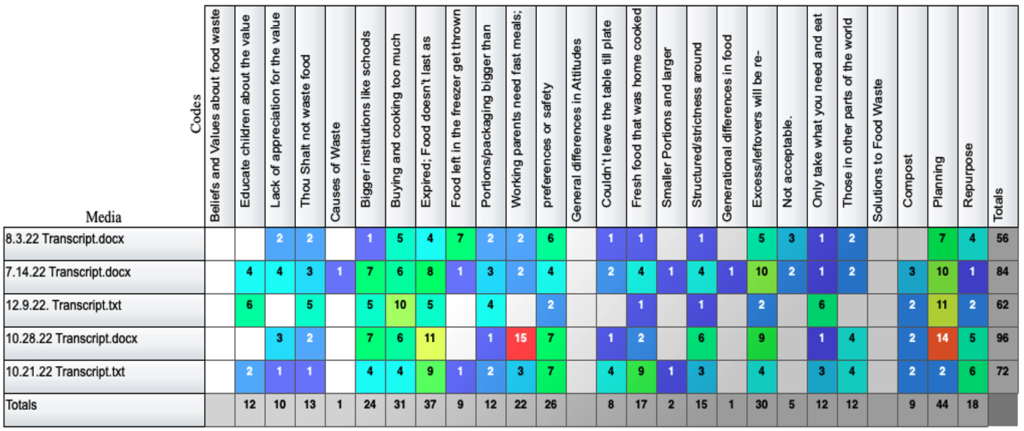Ella Miller, American University; and Raya Rukab, American University
Cite as: Miller, Ella, and Raya Rukab. 2024. “Understanding Household Food Waste: Insights from Wasted Food Listening Sessions in the DC Area”. Food-Fueled, 1, e00009. doi:10.57912/25642803.
Please click here to download the piece as a PDF. The text is also listed below.
Introduction
This project delves into the attitudes and behaviors of diverse households in the D.C. area regarding food waste through innovative Wasted Food Listening Sessions. These sessions explored beliefs, origins, household practices, and potential solutions for minimizing household food waste. Through these listening sessions and the identification of major themes, the research team explored potential avenues and incentives for tailoring strategies by household type to reduce waste.
These listening sessions served to inform the team’s strategy to effectively plan and implement household food waste reduction programs (or initiatives).
Methods
The project involved holding five one-hour listening sessions in Fall 2022 for different household types—including older adults (55+), families with children, and single adults aged 20-40. These sessions, conducted both in-person and virtually, involved posing questions to prompt discussions on household food practices and habits that relate to food waste, awareness of food waste, and beliefs and attitudes about causes and solutions.
Upon joining the project, Ella’s and Raya’s roles as research assistants included transcribing the listening sessions, coding, and analyzing the qualitative data. Along with the team, they reviewed the transcripts from the listening sessions and created a comprehensive codebook encompassing five main themes, or domains, with 21 corresponding topic codes within the domains:
- Beliefs and Values about Food Waste
- Help educate children about the value and benefits of food
- Lack of appreciation for the value of food
- Thou shalt not waste food
- Causes of Waste
- Bigger institutions like schools and grocery stores waste the most
- Buying and cooking too much
- Expired: food spoils more quickly
- Food left in the freezer gets thrown out (not labeled/disorganized)
- Portions/packaging bigger than needed but better value
- Working parents need fast meals; are busy and have less time
- Food safety preferences
- General Differences in Food Practices,
- Couldn’t leave the table until plate was cleaned
- Fresh food that was home-cooked
- Smaller Portions and larger families
- Structured/strictness around mealtimes
- Generational Differences in Attitudes Toward Food Waste, and
- Excess/leftovers will be re-purposed; nothing thrown away
- Not acceptable
- Only take what you need and eat what you take
- Those in other parts of the world are less fortunate
- Solutions to Food Waste
- Compost
- Planning – keep a list
- Repurpose into other meals; reuse everything
Analysis
Using Dedoose, a qualitative research software, they categorized quotes into different domains. Figure 1, generated by Dedoose, illustrates the major themes across all listening sessions. In subsequent months, they refined themes, selecting the top three from each demographic group to tailor effective interventions for specific household types.
Figure 1. Coded interview responses from listening sessions

The major themes identified per demographic group were as follows. The older adults’ intervention will focus on planning, repurposing excess food, and managing expired food. Families with children will receive interventions addressing expired food, convenience, and planning. For single adults, the intervention will emphasize planning, addressing excess buying and cooking, and emphasizing the importance of education and portion control.
Discussion
Overarching findings highlighted effective planning as a key solution to reducing household food waste across household types with expired food identified as a major cause. These insights were presented at the Society for Nutrition Education and Behavior (SNEB) Conference in July 2023 in Washington DC, and the team is currently shaping interventions for various household types with a pilot study scheduled for spring 2024.
Next Steps
The project’s significance lies in its potential to inform behavior modification strategies to reduce food waste. The planned future interventions include providing educational materials tailored to each group one to two times a week for four weeks total. Measurement strategies will include pre- and post-measurement of knowledge, behavior, motivation, attitude, and physical food waste levels.
